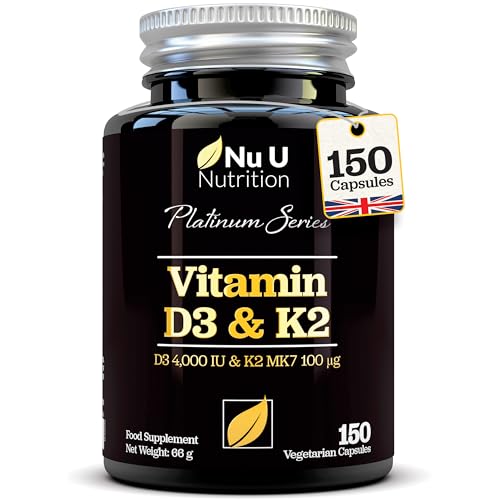The Proven Benefits of Vitamin D3 and K2
Introduction to Vitamins D3 and K2
Vitamins D3 and K2 are essential fat-soluble vitamins that play significant roles in maintaining overall health and well-being. Vitamin D3, also known as cholecalciferol, is primarily obtained through sun exposure, dietary sources such as fatty fish, egg yolks, and fortified foods. This vitamin is crucial for promoting calcium absorption in the gut, which supports bone health and immune system functionality. By facilitating the transportation of calcium, Vitamin D3 helps to prevent deficiencies that can lead to osteoporosis and other health complications.
Conversely, Vitamin K2, or menaquinone, is often found in fermented foods, certain cheeses, and animal products. This vitamin is critical for the regulation of calcium in the body, particularly in guiding calcium to bones and teeth while preventing its accumulation in soft tissues and arteries. This synergy between Vitamins D3 and K2 is notable, as their combined action optimizes calcium metabolism, promoting overall cardiovascular and skeletal health.
The relationship between Vitamins D3 and K2 is why they are frequently discussed together in health contexts. They complement each other’s functions: while Vitamin D3 enhances calcium absorption, Vitamin K2 ensures that calcium is deposited in appropriate areas within the body. Deficiencies in either vitamin can lead to significant health issues. For example, insufficient Vitamin D3 levels may result in weakened bones, while a lack of Vitamin K2 can increase the risk of heart disease due to calcium mismanagement. Both vitamins are therefore essential for maintaining health, and ensuring adequate intake through diet or supplementation can lead to improved vitality and reduced risk of chronic illnesses.
Benefits of Vitamin D3
Vitamin D3, also known as cholecalciferol, plays a pivotal role in maintaining several aspects of health, particularly bone integrity, immune function, and mood regulation. One of the primary benefits of Vitamin D3 is its critical involvement in calcium absorption, which is essential for bone health. Adequate levels of this vitamin ensure that bones remain strong and dense, thereby reducing the risk of fractures and conditions such as osteoporosis.
Furthermore, Vitamin D3 has been shown to enhance immune function. It assists in the modulation of the immune response, potentially lowering the likelihood of infections and autoimmune diseases. Research indicates that individuals with sufficient Vitamin D3 levels tend to experience fewer respiratory infections and overall illness, which underscores the importance of maintaining optimal levels of this nutrient.
In addition to its physical benefits, Vitamin D3 is also linked to mood regulation. There is a growing body of evidence that associates low levels of Vitamin D3 with mood disorders, including depression and anxiety. The synthesis of this vitamin in the brain contributes to the production of neurotransmitters such as serotonin, which are crucial for mood stabilization. Therefore, achieving adequate Vitamin D3 levels can positively impact mental well-being.
Vitamin D3 is synthesized in the skin upon exposure to sunlight. However, factors like geographical location, skin pigmentation, and sun exposure duration can impede this natural production. For those who have limited sunlight exposure, dietary sources such as fatty fish, fortified dairy products, and egg yolks, as well as supplements, can be beneficial for maintaining healthy Vitamin D3 levels. To ensure optimal health, it is crucial to be aware of these sources and consider supplementing when necessary, especially in regions with limited sunlight.
Benefits of Vitamin K2
Vitamin K2, a vitamin that plays an essential role in various bodily functions, is distinct from its counterpart vitamin K1 in terms of its benefits and mechanisms of action. One of the primary functions of Vitamin K2 is its involvement in calcium metabolism, which is crucial for maintaining strong bones and optimal cardiovascular health. Unlike Vitamin K1, which mainly helps with blood coagulation, K2 activates proteins that inhibit arterial calcification and promote calcium deposition in bones. This process facilitates the proper utilization of calcium, ultimately preventing complications such as osteoporosis and cardiovascular diseases.
A significant aspect of Vitamin K2 is its synergy with Vitamin D3. While Vitamin D3 helps with calcium absorption in the intestines, Vitamin K2 ensures calcium is effectively directed to the bones and teeth rather than accumulating in soft tissues. This complementary relationship is essential for maintaining skeletal integrity and reducing the risk of heart disease, exemplifying why adequate levels of both vitamins are crucial for overall health.
Dietary sources of Vitamin K2 are diverse, primarily found in fermented foods such as natto, various cheeses, and animal products like egg yolks and chicken. These foods should be incorporated into a well-balanced diet to alleviate the risk of Vitamin K2 deficiency, which can lead to a range of health issues, including weakened bones, increased arterial stiffness, and higher susceptibility to fractures. Understanding the unique contributions of Vitamin K2 helps illuminate its importance in maintaining optimal health and wellness. Therefore, ensuring sufficient intake of this vital nutrient, combined with Vitamin D3, is paramount for overall well-being.
Synergistic Effects and Recommended Dosages
Vitamins D3 and K2 collectively play a significant role in promoting overall health, particularly in bone and cardiovascular health. Vitamin D3 is primarily responsible for enhancing the absorption of calcium from the diet, while Vitamin K2 is essential for directing that calcium to the bones and teeth instead of allowing it to accumulate in arteries and other soft tissues. This synergy offers a compelling case for their combined supplementation, promoting not just the proper utilization of calcium but also minimizing the risk of cardiovascular diseases.
When considering the appropriate dosages of vitamins D3 and K2, one must take into account various factors including age, sex, diet, and lifestyle. For adults, a commonly suggested dosage for Vitamin D3 ranges from 600 to 2000 IU per day, depending on individual needs and existing blood levels of the vitamin. In contrast, Vitamin K2, particularly in its MK-7 form, is often recommended in dosages of around 90 to 200 micrograms per day. These values can vary widely based on dietary sources, sun exposure, and specific health conditions.
Moreover, it is important to be aware of possible interactions and concerns associated with supplementation. For individuals on anticoagulant medications, such as warfarin, the intake of Vitamin K2 should be carefully monitored due to its blood-clotting properties. Additionally, individuals with certain health conditions or on specific dietary restrictions may require personalized recommendations. Consulting with a healthcare provider before starting any supplementation regimen is advisable, as it ensures that the levels of these vitamins are tailored to individual health needs.
Understanding the synergistic effects of Vitamins D3 and K2 empowers individuals to make informed decisions regarding their health. By adhering to recommended dosages and remaining aware of potential interactions, one can optimize the benefits these vitamins offer for better overall health.
- ✔ 𝗨𝗡𝗥𝗜𝗩𝗔𝗟𝗟𝗘𝗗 𝗩𝗔𝗟𝗨𝗘 – We offer a staggering 150 D3 & K2 capsules per bottle for a full 5 month’s supply. Most other suppl…
- ✔ 𝗘𝗦𝗦𝗘𝗡𝗧𝗜𝗔𝗟 𝗡𝗨𝗧𝗥𝗜𝗘𝗡𝗧𝗦 – We keep it simple. Our Platinum Series Vitamin D3 and K2 supplement offers two essential vitamin…
- ✔ 𝗗𝟑 𝗪𝗜𝗧𝗛𝗢𝗨𝗧 𝗧𝗛𝗘 𝗦𝗨𝗡 – Sunlight is the most common source of Vitamin D but most people don’t get enough exposure to it t…







